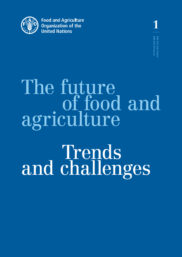
The Future of Food and Agriculture: Trends and Challenges

FAO’s vision is of a ‘world free from hunger and malnutrition, where food and
agriculture contribute to improving the living standards of all, especially
the poorest, in an economically, socially and environmentally sustainable
manner’. To help its Member Countries realize that shared vision – individually
at the national level and collectively at the regional and global levels – FAO organizes
its work taking account of the main challenges facing the food and agriculture sector.
The present study, which was undertaken for the quadrennial review of FAO’s Strategic
Framework and preparation of the Organization’s Medium-Term Plan, 2018–21, lays
out key global trends and challenges that will influence food and agriculture in the
coming decades.
The trends and challenges analysed here are cause for both hope and concern. Much
progress has been made in reducing hunger and poverty and improving food security
and nutrition. Gains in productivity and technological advances have contributed to
more efficient resource use and improved food safety. But major concerns persist.
Some 795 million people still suffer from hunger, and more than two billion from
micronutrient deficiencies or forms of overnourishment. In addition, global food
security could be in jeopardy, due to mounting pressures on natural resources and
to climate change, both of which threaten the sustainability of food systems at large.
Planetary boundaries may well be surpassed, if current trends continue.
Our assessment of prevailing trends suggests, therefore, that in order to realize
FAO’s vision, transformative change in agriculture and food systems are required
worldwide. In FAO’s view, there are 10 key challenges that need to be addressed if we
are to succeed in eradicating hunger and poverty, while making agriculture and food
systems sustainable. Those challenges include the uneven demographic expansion
that will take place in the coming decades, the threats posed by climate change, the
intensification of natural disasters and upsurges in transboundary pests and diseases,
and the need to adjust to major changes taking place in global food systems.
- Issues:
- Health, Climate Change, Natural Resources
- Region:
- Global
- Year Published:
- 2017

